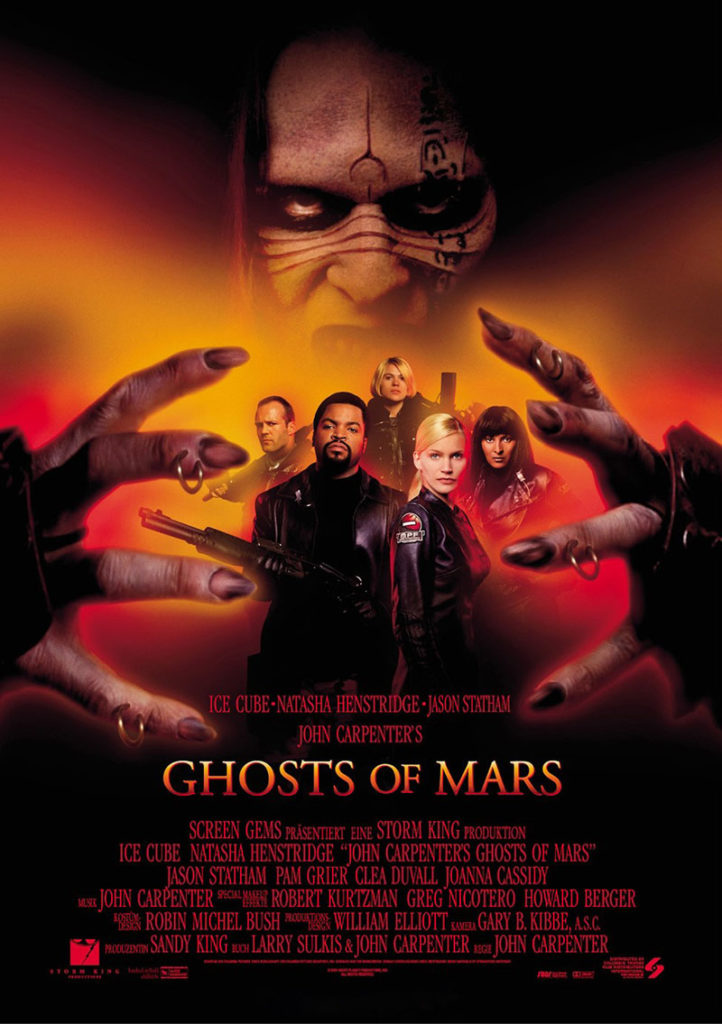 John Carpenter is one of my favorite directors. He’s not on the Mount Rushmore of filmmakers, but his best films can be thought of as eminently watchable. They are respected. They are known and successful enough that a lot have been remade. But he also has some films that are not so good. It would be easy to blame Carpenter’s poorer quality films on budget, but that does not compute. Carpenter worked magic with the measly budgets he had in Halloween and Escape from New York. Rather, something happened in the late 1980s, starting with Prince of Darkness in 1987, that precipitated a steady decline. There were still sparks of life in his films, but that eminently watchable quality of his films seemed to fly away. In its place was substituted cheapness, sometimes of rank quality, and this turn was inexplicable from a filmmaker who had done so much with so little throughout his career.
John Carpenter is one of my favorite directors. He’s not on the Mount Rushmore of filmmakers, but his best films can be thought of as eminently watchable. They are respected. They are known and successful enough that a lot have been remade. But he also has some films that are not so good. It would be easy to blame Carpenter’s poorer quality films on budget, but that does not compute. Carpenter worked magic with the measly budgets he had in Halloween and Escape from New York. Rather, something happened in the late 1980s, starting with Prince of Darkness in 1987, that precipitated a steady decline. There were still sparks of life in his films, but that eminently watchable quality of his films seemed to fly away. In its place was substituted cheapness, sometimes of rank quality, and this turn was inexplicable from a filmmaker who had done so much with so little throughout his career.
I knew Ghosts of Mars was going to be trouble before the opening credits. Viewers are treated to a voiceover explaining the situation on Mars in the 22nd century, while at the same time captions flash on the screen providing even more information. It’s a jumble of sci-fi exposition, and the lack of care taken in this introduction is not a good sign.
In the future, Mars has been subject to terraforming, and the process is almost complete. There aren’t any plants to be seen on the red planet, but the air is breathable. Mars, and Earth, are ruled by a matriarchy. The Mars police force is mostly women, and has been tasked with keeping law and order intact on a planet that shares much with Hollywood’s vision of the Old West.
Natasha Henstridge is the film’s main protagonist. She plays Lieutenant Melanie Ballard of the Mars police. She is part of a team, including Pam Grier, Clea Duvall, Jason Statham, and Liam Waite, that has been sent to a remote mining camp to transport a captured murder suspect, Desolation Williams (Ice Cube), back to the capital for trial. But, things are not as they seem. There’s a wild story surrounding the capture of Williams, involving stolen loot and bodies missing their heads. But it doesn’t add up. Williams is a badass killer, but he’s not a monster. He’s the type of anti-hero, disestablishment character that Carpenter loves. He’s used this character many times. Napoleon Wilson, Snake Plissken, Jack Burton, John Nada, and now Desolation Williams. They’re all the same guy. And there’s no way that Carpenter would make a film where a cop is the only good guy. That would be sacrilege to a man who, from watching his filmography, clearly has much distrust for authority.
Williams, rather than being a cold-blooded killer, instead stumbled upon a massacre brought about by the souls of disembodied Martian natives. It turns out that Mars used to be home to a Bronze Age warrior civilization that loves nothing more than decapitating invaders, which is exactly what we humans are in this flick. The Martians possess the bodies of humans and form a relentless killer horde. And Henstridge and company walk right into it.
What follows plays out much like a zombie flick. The main cast is in an isolated environment, and must hold off the horde long enough to make their escape. There is much promise in the ideas behind the film, even if there isn’t that much originality. But originality is not necessary to make a good film. What is required is care and meticulousness, and Ghosts of Mars seems to have none of that. Many of the little things are off. There’s a lot of gunplay in this film, but the cast barely know how to handle their weapons. A few days of firearms training would have gone a long way towards making the gunfights more believable. The sets and lighting are Corman-esque, as is much of the photography. There are multiple instances where characters that were inserted into the story as an afterthought leave in the exact same way. Wanda De Jesus plays a totally unnecessary addition to the cast, and the last we viewers see of her she is fighting off part of the horde, and then that’s it. No more Wanda. I suppose something like this could be forgiven, if Carpenter didn’t make half the non-horde peripheral cast members disappear from the movie in the same way.
John Carpenter, once upon a time, took many of the same ideas that are in this film and made good movies out of them. Ghosts of Mars was his penultimate film, and, I hate to say it, is the last gasp of a filmmaker whom I respect. I’m hard on this flick, and many other Carpenter films that I feel are subpar, because I know that he was capable of doing better, and for whatever reason, didn’t. Alien: Resurrection is a better film than Ghosts of Mars.
